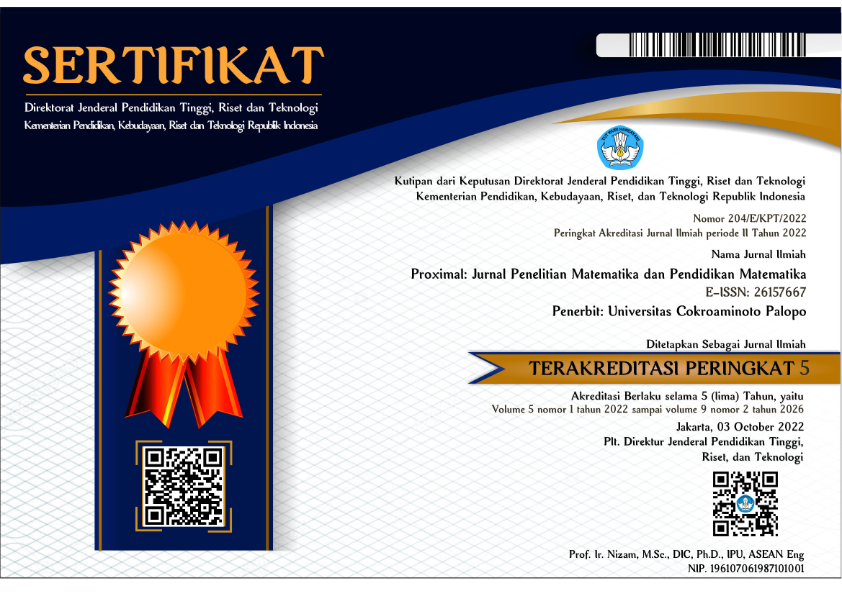Respon Siswa terhadap Penggunaan Missouri Mathematics Project dengan Pendekatan Problem Solving dalam Pembelajaran Matematika
DOI:
https://doi.org/10.30605/proximal.v8i4.7154Keywords:
Student Responses, Missouri Mathematics Project, Problem Solving, Mathematics LearningAbstract
Anggapan bahwa mata pelajaran matematika sulit dan membosankan masih menjadi masalah umum di Indonesia. Salah satu penyebabnya adalah kurangnya variasi metode pembelajaran yang mampu menumbuhkan pengalaman belajar yang menyenangkan. Penerapan MMP dengan Problem Solving diharapkan dapat mengatasi hal tersebut dengan menghadirkan pembelajaran yang bermakna dan kontekstual. Penelitian ini bertujuan menggambarkan dan menganalisis respon siswa terhadap penerapan model pembelajaran Missouri Mathematics Project (MMP) yang dipadukan dengan pendekatan problem solving dalam pembelajaran matematika. Struktur MMP meliputi review, development, controlled practice, seatwork, hingga assignment. Sementara itu, pendekatan problem solving focus pada pemecahan masalah nyata sehingga siswa terbiasa berpikir kritis dan kreatif. Metode penelitian ini adalah kualitatif dengan pendekatan deskriptif. Subjek penelitian terdiri atas 20 siswa kelas VIII di SMP Negeri 1 Marioriawa. Data dikumpulkan melalui observasi, wawancara mendalam, serta dokumentasi, dan dianalisis dengan reduksi data, penyajian data, serta penarikan kesimpulan. Hasil penelitian menunjukkan bahwa respon siswa bersifat positif. Siswa lebih aktif dan berani mengemukakan pendapat, aktivitas kelompok membantu siswa berpikir kritis dan menyelesaikan masalah secara kolaboratif, pembelajaran menjadi lebih bermakna karena siswa terlibat langsung dalam pemecahan masalah nyata. Beberapa siswa masih mengalami kesulitan memahami langkah-langkah problem solving secara sistematis, namun mereka menunjukkan antusiasme tinggi untuk belajar. Dengan demikian, penerapan model MMP dengan pendekatan problem solving efektif untuk meningkatkan keterlibatan siswa dalam pembelajaran matematika.
References
Atsnan, Muh. F., Gazali, R. Y., & Nareki, M. L. (2018). Pengaruh pendekatan problem solving terhadap kemampuan representasi dan literasi matematis siswa. 5(2), 135–146. https://doi.org/10.21831/JRPM.V5I2.20120 DOI: https://doi.org/10.21831/jrpm.v5i2.20120
Connell, M. L. (2024). Developing Mathematical Literacy (pp. 116–134). IGI Global. https://doi.org/10.4018/979-8-3693-0843-1.ch007 DOI: https://doi.org/10.4018/979-8-3693-0843-1.ch007
Dalimunthe, A., & Ariani, N. A. (2023). Peningkatan Kemampuan Berpikir Kritis Matematis Siswa melalui Model Pembelajaran Missouri Mathematics Project. Jurnal Basicedu, 7(1), 1023–1031. https://doi.org/10.31004/basicedu.v7i1.4812 DOI: https://doi.org/10.31004/basicedu.v7i1.4812
Hasan, A. (2024). Problem-Based Math Learning Strategies To Improve Students’ Problem-Solving Skills. 1(1), 22–26. https://doi.org/10.59613/rm65x686 DOI: https://doi.org/10.59613/rm65x686
Harianda, B., & Junedi, B. (2021). Peningkatan kemampuan pemecahan masalah matematis siswa melalui penerapan model pembelajaran missouri mathematic project. Journal of Database Management, 2(1), 33–41. https://doi.org/10.34007/JDM.V2I1.616 DOI: https://doi.org/10.34007/jdm.v2i1.616
Köle, H., Laamena, C. M., & Gaspersz, M. (2021). Peningkatan Hasil Belajar Siswa Kelas VII Dengan Model Pembelajaran Missouri Mathematics Project (MMP). Jurnal Padegogik, 4(2), 1–12. https://doi.org/10.35974/jpd.v4i2.2518 DOI: https://doi.org/10.35974/jpd.v4i2.2518
Marniyanti, M., Auliyani, N., Saajidah, S., Munirah, S., Putra, A. P., Zaini, M., Fajeriadi, H., Hernawati, H., & Yulinda, R. (2024). Optimalisasi pembelajaran sumber daya alam melalui interaksi keterampilan sains dan pendekatan problem solving. 1(2), 84. https://doi.org/10.20527/bioco.v1i2.13929 DOI: https://doi.org/10.20527/bioco.v1i2.13929
Mustafa, A. N. (2024). Mathematics anxiety causes, consequences, and coping strategies. International Journal of Advanced Research, 12(11), 1268–1276. https://doi.org/10.21474/ijar01/19941 DOI: https://doi.org/10.21474/IJAR01/19941
Moreno, D. F. (2022). Modelo para el diseño de un organizador avanzado: el encuentro entre aprendizaje significativo y el storytelling. Trans-Pasando Fronteras, 18, 206–241. https://doi.org/10.18046/retf.i18.5318 DOI: https://doi.org/10.18046/retf.i18.5318
Ndiung, S., Tecing, P. Y. S., & Sennen, E. (2021). Efektivitas pendekatan problem solving dalam mengembangkan kemampuan pemecahan masalah matematika siswa sekolah dasar. Jurnal Literasi Pendidikan Dasar, 2(1), 1–11. https://doi.org/10.36928/jlpd.v2i1.2041 DOI: https://doi.org/10.36928/jlpd.v2i1.2041
Nurharyanto, D. W., & Jaliani, J. (2024). Pengaruh pendekatan problem solving terhadap prestasi belajar siswa kelas v sekolah dasar. MUST: Journal of Mathematics Education, Science and Technology, 9(1). https://doi.org/10.30651/must.v9i1.20483 DOI: https://doi.org/10.30651/must.v9i1.20483
Zaida, S., & Lestari, P. E. P. (2024). Pengaruh Model Missouri Mathematics Project (MMP) terhadap Hasil Belajar Matematika ditinjau dari Kemandirian Belajar. https://doi.org/10.28918/circle.v4i1.6897 DOI: https://doi.org/10.28918/circle.v4i1.6897
Zhou, Y., & Cayaban, N. B. (2024). Problem Solving Strategies in Mathematics of Students in the of Primary Level: Basis for Strategic Study Guide. Journal of Education and Educational Research, 8(2), 32–37. https://doi.org/10.54097/wr425v38. DOI: https://doi.org/10.54097/wr425v38
Downloads
Published
Issue
Section
License
Copyright (c) 2025 Baharuddin

This work is licensed under a Creative Commons Attribution 4.0 International License.
In submitting the manuscript to the journal, the authors certify that:
- They are authorized by their co-authors to enter into these arrangements.
- The work described has not been formally published before, except in the form of an abstract or as part of a published lecture, review, thesis, or overlay journal.
- That it is not under consideration for publication elsewhere,
- That its publication has been approved by all the author(s) and by the responsible authorities – tacitly or explicitly – of the institutes where the work has been carried out.
- They secure the right to reproduce any material that has already been published or copyrighted elsewhere.
- They agree to the following license and copyright agreement.
License and Copyright Agreement
Authors who publish with this journal agree to the following terms:
- Authors retain copyright and grant the journal right of first publication with the work simultaneously licensed under Creative Commons Attribution License (CC BY 4.0) that allows others to share the work with an acknowledgment of the work's authorship and initial publication in this journal.
- Authors are able to enter into separate, additional contractual arrangements for the non-exclusive distribution of the journal's published version of the work (e.g., post it to an institutional repository or publish it in a book), with an acknowledgment of its initial publication in this journal.
- Authors are permitted and encouraged to post their work online (e.g., in institutional repositories or on their website) prior to and during the submission process, as it can lead to productive exchanges, as well as earlier and greater citation of published work.















